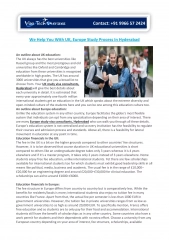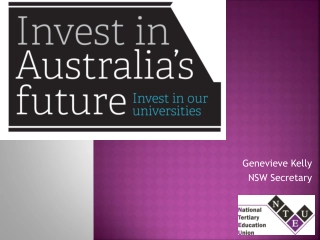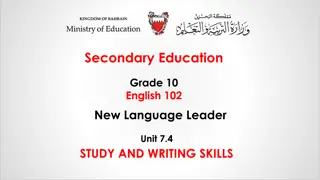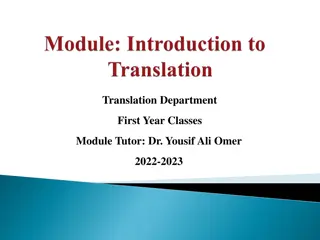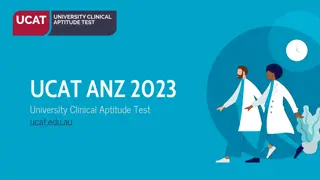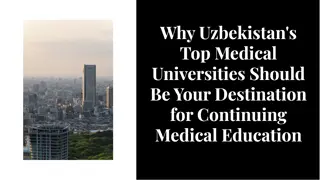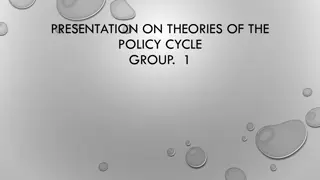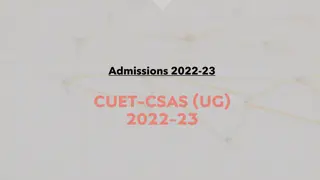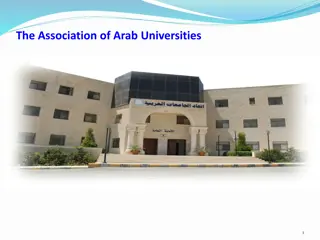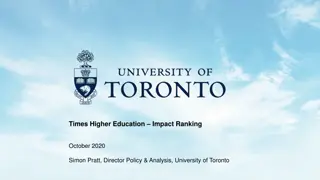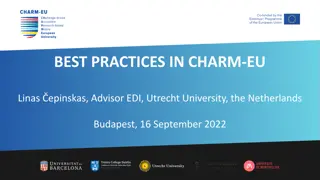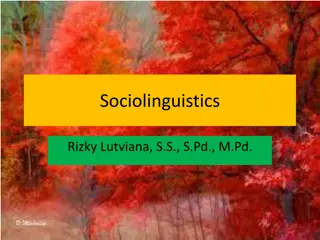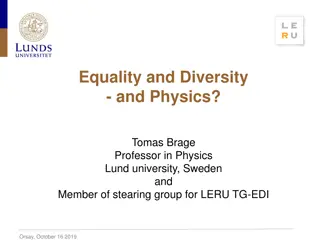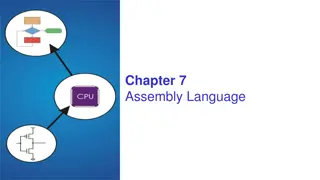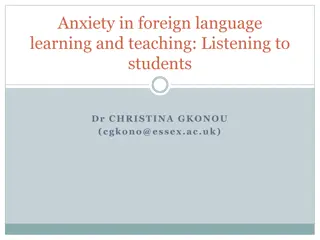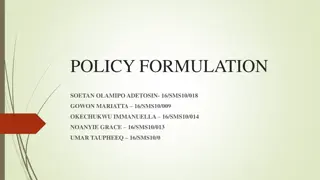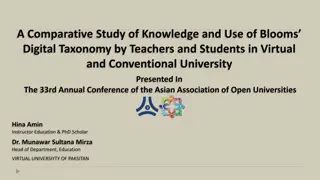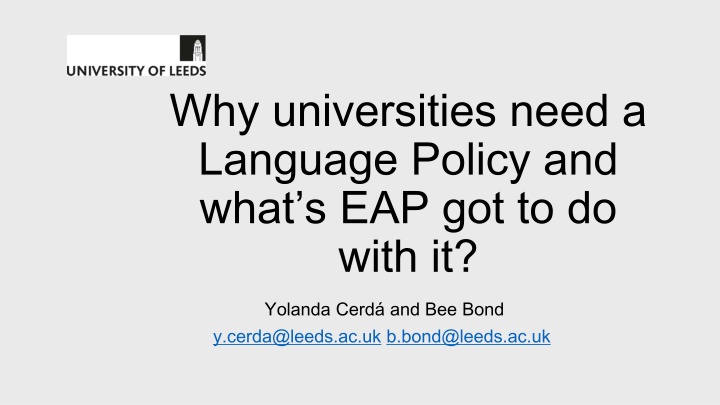
Importance of Language in Higher Education
Explore the significance of language policies at universities and the role of English for Academic Purposes (EAP) in teaching and professional environments. Delve into the visibility of language in academia, student perspectives on language proficiency, deficit approaches, and questioning current EAP practices.
Download Presentation

Please find below an Image/Link to download the presentation.
The content on the website is provided AS IS for your information and personal use only. It may not be sold, licensed, or shared on other websites without obtaining consent from the author. If you encounter any issues during the download, it is possible that the publisher has removed the file from their server.
You are allowed to download the files provided on this website for personal or commercial use, subject to the condition that they are used lawfully. All files are the property of their respective owners.
The content on the website is provided AS IS for your information and personal use only. It may not be sold, licensed, or shared on other websites without obtaining consent from the author.
E N D
Presentation Transcript
Why universities need a Language Policy and what s EAP got to do with it? Yolanda Cerd and Bee Bond y.cerda@leeds.ac.uk b.bond@leeds.ac.uk
Where/ when does language become visible (and to whom)? These are questions we are asking academics in our institution: Can you think of examples where language(s) have become of interest or a consideration in your teaching or other aspects of your professional life? This might involve, for example: Disciplinary considerations Different registers Different types of English Different language varieties
Why language matters: student examples (Bond 2020) Because my writing s not that great to be honest, in terms of spelling and things like that. But yeah in terms of the style, very much I just try to base it on papers. I try to keep it very direct as well. Which is something that I ve just learnt from science that you just like short sentence, like to the point. Partly that s imposed upon you by word counts as well because we re often bumping up against those. So yeah, I just try to keep it direct because in science you re just trying to communicate in the simplest way possible. Because a bit like what you ve been discussing as well, science is a very international thing and most of its written in English and so you don t want it written in a strange way because you want everyone to be able to understand when English isn t their first language. (FS5) recently I found that the lecturers just do not pay attention to your language because I was told that they just mark for your knowledge, your understanding and your referencing, I suppose, but they don't need to mark you for your language. So I was shocked. (5B)
Why languages matters; deficit approaches and the status quo? Folk and systemic deficit approaches to language (e.g. OfS SPaG focus) Systemic language bias and policing in education (Cushing and Snell 2022) Deficit approaches arguably compounded by EAP mechanisms (entry reqs, presessional courses, language tests, academic integrity and misconduct, etc.) Monolingualism espoused as a norm in multilingual institutions (in UK at least) Monolingual EAP pedagogic practices language fixers? Working on the periphery (do we toe a line?) Are we (in EAP) in a double-bind with EAP as a by-product of linguistic imperialism (Phillipson 1992) and globalisation
Why languages matters: questioning our EAP practices Where and how do some students [and staff?] feel linguistically excluded or disadvantaged? How do we make it clear to students what level of linguistic proficiency is expected and in what contexts? Do we all agree what this looks like? Do we know how and where this is taught? How do we move away from the non-pedagogy of osmosis and assumption that language gives immediate access to knowledge and must therefore be transparent (Turner, 2011: 29) and shift towards the understanding that language is integral to the academic learning process? (How) do we differentiate between communicative and technical proficiency? Should we? In what ways are other language(s) relevant or useful?
Rethinking how we think and talk about language(s) FROM Languages as stable, fixed and boundaried (linked to nation states) Language as a skill individuals master Language as a neutral code Language as a problem deficit and remedial approaches Monolingualism as the norm TO Language(s) as dynamic, evolving and connected Language as a social resource for meaning-making in constant development Language as a source of cultural and symbolic capital (Turner 2018, O'Regan 2021) Languages / repertoires as a resource (Blommaert 2010, Rampton 2019) Multilingualism and Translingualism as a reality?
What is a language policy for? National language(s), e.g. India Revitalization / preservation of language(s), e.g. Wales Recognition of diversity and language(s), e.g. Jersey Education through/ via specific language(s) (EMI; CLIL)
Language policy v. language planning (50s and 60s) interventionist control language policy, on the other hand, refers to a set of principles regarding language behaviour, although this tends to vary from one context to another (Shohamy 2006: 49) BUT Spolsky (2004: 222) the real language policy of a community is more likely to be found in its practices (in Shohamy 2006)
[Why] should a university adopt a language policy? Recognition of central importance of language to education and HEIs (Turner 2004) Make already existing assumptions visible and open for discussion Provide a [clear] stance in relation to language policing (e.g. SP&G) Recognition of diversity of the university population and the range of linguistic repertoires Highlight structural inequalities that are enacted through linguistic prejudice the 'linguistic glass ceiling' (Bhatt, Badwan and Madiba 2022) Work for education that is more inclusive/ accessible
What can be done in our HEIs / local contexts? Scholarship on linguistic diversity and pedagogies with linguistic sensibilities events, publications, conference presentations...at least let's unpick our assumptions Institution-wide workshops / presentations linked to how language affects curriculum, assessment and pedagogy Linking to scholars, research and research groups (in linked disciplines sociolinguistics, applied linguistics, education, sociology etc.) Institutional strategy documents where do(es) language(s) fit in? (the global graduate, our global and decolonised curricula etc...) Working with disciplines case studies and collaborations Working with students current, PGRs, alumni... And... But...
Future Explorations: Implications for (EAP) pedagogy Language(s) and linguistic repertoires could be recognised in pedagogic practices how could we have explicit conversations about this? Can we articulate and do we encourage others to teach the language of their disciplines? How? Who can help with this? How is the content of a subject linked to language and communication practices? Interrogate the relationship between language and subject knowledge Raising awareness of elements of communication often taken for granted eg conversational norms (turn- taking, interruptions, silence etc.) Being explicit about communicative expectations in the classroom and interrogating these expectations in conversation with students Linking decolonising and the hidden curriculum to language(s) can we / should we de-centre English at times? In what contexts? Could we develop resources for other academics and students? How might we consider the inclusion of multilingual resources and guidance for their use in certain academic contexts How do we help students and other academics to navigate the affordances and pitfalls of AI?
Future work: Raising critical engagement with language practices at institutional level Will involve problematising deficit views of language competence; developing our understanding of the evolving cultural politics of English and EAP and sharing and developing understandings of ...: translanguaging multilingualism linguistic justice language activism as well as engaging with critical debates around: -'standards' of English (eg Murray 2016) -global English and English hegemony (O'Regan 2021) -translation tools and other forms of AI With reflexivity about our own practices and assumptions
And finally we perceive language in global higher education as a wicked problem , an important area of critical inquiry that requires international and inter-disciplinary explorations of opportunities, challenges, tensions, injustices, struggles, fears and hopes that face the multilingual university. Bhatt, Badwan and Madiba (2022)
Please send us comments and feedback! PADLET : Languages across the curriculum
References References Baker Bell, A. (2020) Linguistic Justice: Black Language, Literacy, Identity, and Pedagogy. New York: Routledge Bhatt, I; Badwan, K. & Madiba, M. (2022) Critical perspectives on teaching in the multilingual university, Teaching in Higher Education, 27:4, 425-436, DOI: 10.1080/13562517.2022.2058295 Blommaert, J. (2010) The Sociolinguistics of Globalisation. Cambridge: CUP Bond, B. (2020). Making Language Visible in the University: English for Academic Purposes and Internationalisation. Bristol: Multilingual Matters. Bruce, I. (2008). Academic Writing and Genre: A systematic analysis. London, Continuum Bruce, I. (2011). Theory and concepts of English for Academic Purposes. Basingstoke Palgrave Macmillan. Bourdieu P. (1986). The forms of capital (Nice R., Trans.). In Richardson J. (Ed.), Handbook of theory and research for the sociology of education (pp. 241 258). Greenwood. Cushing, I. and Snell, J. 2022. The (white) ears of Ofsted: A raciolinguistic perspective on the listening practices of the schools inspectorate. Language in society., pp.1 24. Kachru, B. B. (1992) The Other tongue: English across cultures. 2nd edition, Urbana: University of Illinois Press. Languages Policy working party (2022) Language Policy for Jersey Education. Government of Jersey. Lea, M. R. & Street, B. (2006) The "Academic Literacies" Model: Theory and Applications, Theory Into Practice, 45:4, 368-377, DOI: 10.1207/s15430421tip4504_11 Milroy, J. and Milroy, L. (2012). Authority in language: investigating language prescription and standardisation Fourth edition. London: Routledge. Murray, N. (2016). Standards of English in Higher Education: issues, challenges and strategies. Cambridge: Cambridge University Press. O'Regan, J.P., 2021. Global English and political economy. Routledge. Phillipson, R. (1992) Linguistic imperialism. Oxford: Oxford University Press. Phipps, A. (2019) Decolonising Multilingualism Struggles to Decreate Bristol: Multilingual Matters Rampton, B (2019) What do we mean by multilingual ? Linguistic repertoires. Working Papers in Urban Language and Literacies , Paper 260. https://www.academia.edu/40461707/WP260_Rampton_2019_What_do_we_mean_by_multilingual_Linguistic_repertoires Shohamy, E. (2006) Language Policy: Hidden agendas and new perspectives. London: Routledge Turner, J. (2011). Language in the Academy: cultural reflexivity and intercultural dynamics. Bristol: Multilingual Matters. Turner, J. (2004). Language as academic purpose. Journal of English for Academic Purposes 3 95-109. Turner, J. (2018) On Writtenness: The Cultural Politics of Academic Writing. London: Bloomsbury Wei, Li (2018) Translanguaging as a Practical Theory of Language, Applied Linguistics, Volume 39, Issue 1, February 2018, Pages 9 30, https://doi.org/10.1093/applin/amx039

